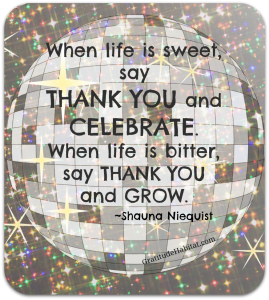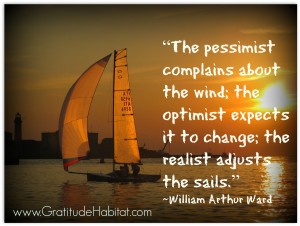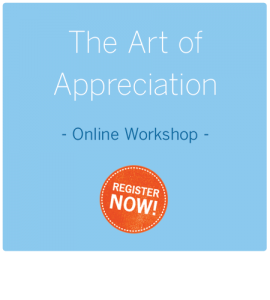Optimism VS Pessimism…Or Somewhere In Between
Never go to excess, but let moderation be your guide. ~Marcus Tullius Cicero
There is something to be said for moderation. When it comes to the debate of optimism VS pessimism, many of us fall on one side of the fence or the other. Sometimes, we may even bounce back and forth, depending upon the situation.
There is plenty of research to back the claim that an optimistic attitude boosts success and happiness. Numerous studies show that positive thinking has the following benefits:
- Reduces tension
- Enhances emotional well-being
- Better overall cardiovascular health
- Less worried
- More resilient
- Healthier lifestyle
- Better able to cope with stress
It turns out that these benefits of optimism don’t always equip us for long-term stresses. Generally, optimists perceive they are less stressed because they are able to cope or because they see the world through rose-colored glasses. But, when stressors become extremely severe and continue over a long period of time, positive thinkers suffered a lower immune response than their ‘negative thinking’ counterparts. By expecting the worst, pessimists are at times better prepared.

Part of the reason for the reduced immune response of optimists is the manner in which they approach stressful situations. When faced with a stressor, whether it’s a major life crisis or a daily “hassle”, we can cope in one of two ways.
1. Emotion-focused coping
The use of strategies such as looking at the bright side, putting the event out of your mind or calming your feelings through relaxation or meditation.
2. Problem-focused coping
This method addresses the issue firsthand and attempts to get to the root of the stress.
- There is no “right” way to cope with hard situations. Sometimes emotion-focused coping is more adaptive and at other times, problem-focused coping will better alleviate the stress.
- Emotion-focused coping tends to work best when it’s past the point of our ability to alter the situation or when there is a continuous stressful situation beyond our control.
- Problem-focused coping proves much more effective when our efforts and actions will make a difference in the outcome of the situation.
With their strong belief in the power of positive thinking, optimists normally use emotion-based coping, only employing problem-focused coping past the point of when they are able to actually change the outcome of a situation. Many optimists believe the power of positive thinking will result in positive change. This type of perfectionism can result in false and unrealistic expectations.
In The Middle Lies The Realist.

Realists benefit from the strengths of both the optimist and the pessimist, enabling them to face situations with the understanding that thinking positively is beneficial but it must be combined with common sense. Realists see things as they are. They acknowledge that a situation may be negative but they also strive to turn things around and find the positive.
Life has its ups and downs. It is perfectly acceptable for us to have positive or negative reactions to these bumps in the road, be they big or small. By using the benefits of both is when we are able to address and change those situations, allowing us to move on.
Comment & Share
Would you consider yourself an optimist, pessimist or a realist?
What methods do you use to release stress?
Art of Appreciation Online Workshop
Art of Appreciation Online Workshop: $47
Change Your Outlook, Change Your Life
The Art of Appreciation Online Workshop is for people who want to have fun and take charge of their personal happiness by infusing their lives with genuine gratitude. It takes only a few minutes a day and can be fit into your schedule in whatever way works best.
Guided by the daily ‘gratitude-focused’ worksheets, your journey will kick start a powerful shift in personal perspective, opening your eyes to the wonders of life and providing an overall sense of wellbeing.
Register NOW and immediately receive a copy of the eBook: “Gratitude: Loving The Life You Have.”
Have a day filled with gratitude and good things.
Excerpts taken from Psychology Today and Queendom.









